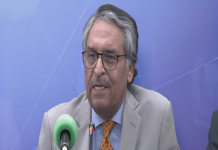Dear Sir,
Today (November 24) marks the 69th anniversary of the iconic Pakistani Urdu poetess Parveen Shakir (1952-94), who was at the height of her fame when she died in a car accident in a most untimely manner in December 1994, just a few weeks after her 42nd birthday. Parveen Shakir had a happy childhood after her parents migrated from Bihar to Karachi after partition. Her inclination towards literature was evident from her school days, when she had started reciting poetry and taking part in radio programs. Her literary promise can be gauged from the fact that her first book of poems, Khushboo, was published when she was twenty-four. However, poetry was not the only field where she displayed her prowess. She was a columnist, and also taught English Literature for nine years, prior to successfully passing the Civil Service of Pakistan exam and joining the Civil Service of Pakistan, where she served in the Customs Department. Legend has it that Parveen was ineligible for the exam given that she was overage and Siddique Salik, the writer who was the Press Secretary of General Zia-ul-Haq at that time, requested the President to give special permission to Parveen to sit in the examination, which she subsequently did. She was also a highly educated woman, with a PhD and another MA in Bank Administration (apart from the two MAs in English literature and Linguistics which she had previously obtained). In 1991 she won the prestigious Fulbright Scholarship and obtained an MA in Public Administration from Harvard University in the United States. Unfortunately, her marital life was not successful, largely because her husband, who was a doctor by profession and a relative of hers, had a different temperament to hers. Parveen broke the conventions of her time by not only becoming one in a handful of female Urdu poets in Pakistan at that time, after the advent of Ada Jafri, Zehra Nigah and Kishwar Naheed; but choosing to focus on her successful professional career rather than be a simple housewife. Her poetry was – and still is – very popular among the youth, making her one of the few poets like Ahmed Faraz and Jaun Eliya whose poetry has stood the test of time despite being stereotyped as the ‘poetry of youth’. The themes of Parveen’s poetry mirror her own experiences: from the rosy experiences of love and separation in her youth, to the pain of an unsuccessful marriage, the rigours of a professional career and then the experiences of motherhood. However her poetry is not all about flowers and fragrance, there are political and social topics as well, like the plight of workers, the insipid life of bureaucracy, and poetic portraits of professional women like herself, facing the challenges of patriarchy. Parveen’s early death marked a serious blow to Urdu literature, but it also immortalized her in the pantheon of writers and poets who were taken from us way too early like Manto, Majaz, Saghar Siddiqi, Mustafa Zaidi and Sara Shagufta.
Raza Naeem | Lahore





